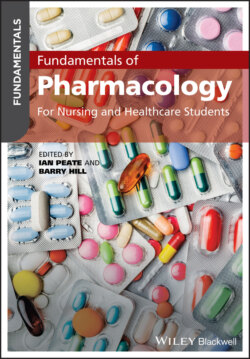Читать книгу Fundamentals of Pharmacology - Группа авторов - Страница 97
References
Оглавление1 Abortion Act (1967). Abortion Act. www.legislation.gov.uk/ukpga/1967/87/contents (accessed 19 September 2019).
2 Baillie, L. and Black, S. (2015). Professional Values in Nursing. Florida, USA: Taylor & Francis Group.
3 Beauchamp & Childress (2009). Principles of Biomedical Ethics, 6e. Oxford: Oxford University Press.
4 Bolam v Friern Hospital Management Committee (1957). 1 WLR 583.
5 Corrigan, O. (2003). Empty ethics: the problem with informed consent. Sociology of Health and Illness 25 (3): 768–792.
6 Data Protection Act (2018). Data Protection Act. www.legislation.gov.uk/ukpga/2018/12/contents/enacted (accessed 19 September 2019).
7 Deber, R., Kraetschmer, N., Urowitz, S. et al. (2007). Do people want to be autonomous patients? Preferred roles in treatment decision‐making in several patient populations. Health Expectations 10: 248–258.
8 Declaration of Helsinki (2008). Ethical principles for medical research involving human subjects. https://www.who.int/bulletin/archives/79%284%29373.pdf (accessed 19 September 2019).
9 Department of Health (2012). Compassion in practice. https://www.england.nhs.uk/wp‐content/uploads/2012/12/compassion‐in‐practice.pdf (accessed 19 September 2019).
10 Edwards, A. and Elwyn, G. (eds.) (2009). Shared Decision‐Making in Health Care. Achieving Evidence‐Based Patient Choice. Oxford: Oxford University Press.
11 Expert Scientific Groups on Phase One Clinical Trials (2006). Final Report. https://webarchive.nationalarchives.gov.uk/20130105143109/www.dh.gov.uk/prod_consum_dh/groups/dh_digitalassets/@dh/@en/documents/digitalasset/dh_073165.pdf (accessed 19 September 2019).
12 Family Law Reform Act (1969). Family Law Reform Act. www.legislation.gov.uk/ukpga/1969/46 (accessed 12 September 2019).
13 Fitzgerald, C. and Hurst, S. (2018). Implicit bias in healthcare professionals: a systematic review. BMC Medical Ethics 18 (19): 1–18.
14 Francis, R. (2013). Report of the Mid Staffordshire NHS Foundation Trust Public Enquiry. London: Stationary Office.
15 General Medical Council (2013). Good practice in prescribing and managing medicines and devices. https://www.gmc‐uk.org/‐/media/documents/prescribing‐guidance:pdf‐59055247.pdf?la=en (accessed 19 September 2019).
16 Gillick v West Norfolk and Wisbech area Health Authority and Department of Health and Social Security (1985). Landmark decision for children's rights. Childright 22: 11–18.
17 Glass v United Kingdom (2004). App. No 61827/00, 39 Eur. H.R.Rep. 15.
18 Goyal, M.K., Kuppermann, M., Cleary, S. et al. (2015). Racial disparities in pain management of children with appendicitis in emergency departments. JAMA Pediatrics 169 (11): 996–1002.
19 Hall, A. (2017). Using legal ethics to improve implicit bias in prosecutorial discretion. Journal of the Legal Profession 42 (1): 111–126.
20 Herring, J. (2018). Medical Law and Ethics. Oxford: Oxford University Press.
21 Human Rights Act (1998). Human Rights Act. www.legislation.gov.uk/ukpga/1998/42/contents (accessed 19 September 2019).
22 Human Tissue Act (2004). Human Tissue Act. www.legislation.gov.uk/ukpga/2004/30/contents (accessed 19 September 2019).
23 Joint Formulary Committee (2019). British National Formulary. https://bnf.nice.org.uk (accessed October 2019).
24 Kelly, D. and Roedderts, E. (2008). Racial cognition and the ethics of implicit bias. Philosophy Compass 3 (3): 522–540.
25 Lang, K.R., Dupree, C., Kon, A. et al. (2016). Calling out implicit bias as a harm in pediatric care. Cambridge Quarterly of Healthcare Ethics 25: 540–552.
26 Medicines & Healthcare products Regulatory Agency (2012). Good Clinical Practice Guide. London: TSO.
27 Medicines for Human Use (Clinical Trials) Regulations (2004). Medicines for Human Use. www.legislation.gov.uk/uksi/2004/1031/contents/made (accessed 19 September 2019).
28 Mental Capacity Act (2005). Mental Capacity Act. www.legislation.gov.uk/ukpga/2005/9/contents (accessed 19 September 2019).
29 Merino, Y., Adams, L., and Hall, W.J. (2018). Implicit bias and mental health professionals: priorities and direction for research. Psychiatric Services 69 (6): 723–725.
30 National Health Service Improvement (2019). Clinical negligence and litigation. https://improvement.nhs.uk/resources/clinical‐negligence‐and‐litigation (accessed 4 September 2019).
31 National Institute of Health and Care Excellence (2018). Guideline 109 Urinary Tract infection (lower): antimicrobial prescribing. www.nice.org.uk/guidance/ng109 (accessed 4 September 2019).
32 Nuremberg Code (1947). Trials of war criminals before the Nuernberg [sic] military tribunals volume 2 “The medical case”. https://www.loc.gov/rr/frd/Military_Law/pdf/NT_war‐criminals_Vol‐II.pdf (accessed 19 September 2019).
33 Nursing & Midwifery Council (2015). Standards for medicines management. http://NMC.org.uk.
34 Nursing & Midwifery Council (2018). The Code: Professional standards of practice and behaviour for nurses, midwives and nursing associates. www.nmc.org.uk/globalassets/sitedocuments/nmc‐publications/nmc‐code.pdf (accessed 19 September 2019).
35 Nursing & Midwifery Council and General Medical Council (2015). Openness and honesty when things go wrong: the professional duty of candour. https://tinyurl.com/zpdk7mk (accessed July 2020).
36 Ozdemir, B.A., Karthikesalingam, A., Sinha, S. et al. (2015). Research activity and the association with mortality. PLoS One 10 (2): e0118253. https://doi.org/10.1371/journal.pone.0118253.
37 Pellegrino, E.D. (1988). For the Patient's Good: The Restoration of Beneficence in Health Care. Oxford University Press.
38 Public Health England (2019). Measles: guidance, data and analysis available at: https://www.gov.uk/government/collections/measles‐guidance‐data‐and‐analysis#epidemiology (accessed 12 September 2019).
39 Puddifoot, K. (2017). Dissolving the epistemic/ethical dilemma over implicit bias. Philosophical Explorations 20 (1): S73–S93.
40 Royal Pharmaceutical Society and Royal College of Nursing (2019). Professional guidance on the administration of medicines in healthcare settings. https://www.rpharms.com/Portals/0/RPS%20document%20library/Open%20access/Professional%20standards/SSHM%20and%20Admin/Admin%20of%20Meds%20prof%20guidance.pdf?ver=2019‐01‐23‐145026‐567 (accessed 19 September 2019).
41 Samanta, J. and Samanta, A. (2011). Medical Law. Basingstoke: Palgrave Macmillan.
42 Stewart, M. and Brown, J. (2001). Patient‐centredness in medicine. In: Evidence‐Based Patient Choice (eds. A. Edwards and G. Elwyn). London: Oxford University Press.
43 Stone, J. and Moskowitz, G.B. (2011). Non‐conscious bias in medical decision‐making: what can be done to reduce it. Medical Education 45: 768–776.
44 Studdert, D., Mello, M., Sage, W. et al. (2005). Defensive medicine among high‐risk specialist physicians in a volatile malpractice environment. JAMA: The Journal of the American Medical Association 293: 2609–2617.
45 Velasquez, M., Andre C., Shanks, S. et al (1988). Ethics and virtue. https://www.scu.edu/ethics/ethics‐resources/ethical‐decision‐making/ethics‐and‐virtue (accessed 19 September 2019).
46 World Medical Association (2008). World Medical Association Declaration of Helsinki. Ethical Principles for Medical Research Involving Human Subjects. https://www.wma.net/wp‐content/uploads/2016/11/DoH‐Oct2008.pdf (accessed 19 September 2019).
47 Williamson, C. (2010). Towards the Emancipation of Patients. Patients' Experiences and the Patient Movement. Bristol: Policy Press.
